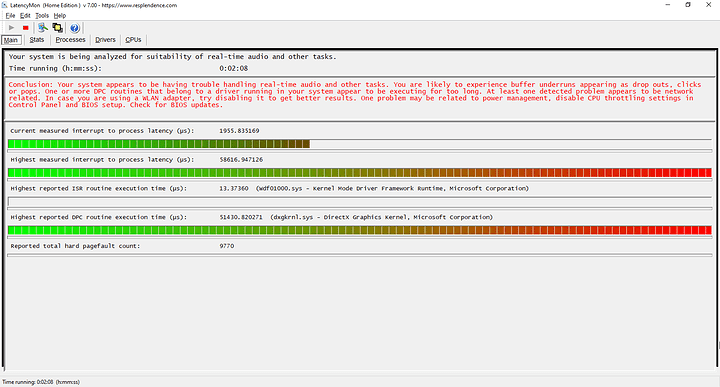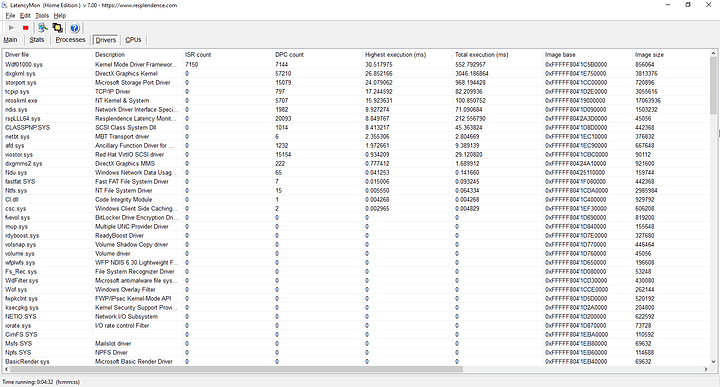I’ve been trying to setup a Windows 10 virtual machine mainly for gaming. I had issues where vfio would give me BAR 0 error and it could not reserve memory. I used a rom file from TechPowerUp for my specific GPU and the VM finally booted.
After setting everything up i downloaded Cinebench and Unigine Heaven to test the performance of my system for comparison. Cinebench score was within a margin of error, around 1200 for both vm and bare metal with my Ryzen 5 2600. With Unigine Heaven it was little bit lower, scored 1767 for bare metal and 1576 on the vm with my RX 580 4 GB, also i noticed a little bit of stutter here and there but it wasn’t horrendous.
When i tried to play games on the vm things changed. First game that i tried was Minecraft. As the chunks loaded it started to stutter really bad and only after it was done the framerate started to stabilize. Figured maybe i should try another game just to make sure i tried Cyberpunk 2077. The framerate couter was relatively stable but it was stuttering really bad. In the general in-game area that i tested my framerate was about 17-20 fps compared to bare metal where it was around 47-50 fps.
Searching through the internet i tried just about anything i could find:
- CPU pinning (according the the topology of my CPU)
- isolating the cores (via kernel parameter) and assigning them exclusively to the vm
- set scaling governor to performance
- set scaling governor to ondemand and setting the threshold to as low as 20
- disabling SMT in BIOS (gave about ~+5 fps but the stuttering was still there)
- giving the vm only cores without hyperthreading
- adding/removing audio devices (i came across a post saying that it can impact overall performance)
- changing IO modes
- enabled every setting related to virtualization in BIOS (IOMMU, SR-IOV, SVM)
I did come across problems when trying to get hugepages working. Running virsh command it said that it can’t reserve the memory and refused to boot even though i had plenty of free memory.
I also ran a program called LatencyMon to maybe get a better idea of what might be the case:
Relevant IOMMU Group that i isolated:
IOMMU Group 2:
00:03.0 Host bridge [0600]: Advanced Micro Devices, Inc. [AMD] Family 17h (Models 00h-1fh) PCIe Dummy Host Bridge [1022:1452]
00:03.1 PCI bridge [0604]: Advanced Micro Devices, Inc. [AMD] Family 17h (Models 00h-0fh) PCIe GPP Bridge [1022:1453]
0a:00.0 VGA compatible controller [0300]: Advanced Micro Devices, Inc. [AMD/ATI] Ellesmere [Radeon RX 470/480/570/570X/580/580X/590] [1002:67df] (rev e7)
0a:00.1 Audio device [0403]: Advanced Micro Devices, Inc. [AMD/ATI] Ellesmere HDMI Audio [Radeon RX 470/480 / 570/580/590] [1002:aaf0]
My /etc/modprobe.d/vfio.conf:
options vfio-pci ids=1022:1452,1022:1453,1002:67df,1002:aaf0
/etc/default/grub:
GRUB_CMDLINE_LINUX_DEFAULT="loglevel=3 quiet amd_iommu=on iommu=pt video=vesafb:off video=efifb:off pci=realloc"
My XML at it’s current state:
<domain type='kvm' xmlns:qemu='(link removed)'>
<name>win10</name>
<uuid>(excluded purposefully)</uuid>
<metadata>
<libosinfo:libosinfo xmlns:libosinfo="(link removed)">
<libosinfo:os id="(link removed)"/>
</libosinfo:libosinfo>
</metadata>
<memory unit='KiB'>12582912</memory>
<currentMemory unit='KiB'>12582912</currentMemory>
<vcpu placement='static'>12</vcpu>
<iothreads>1</iothreads>
<cputune>
<vcpupin vcpu='0' cpuset='0'/>
<vcpupin vcpu='1' cpuset='6'/>
<vcpupin vcpu='2' cpuset='1'/>
<vcpupin vcpu='3' cpuset='7'/>
<vcpupin vcpu='4' cpuset='2'/>
<vcpupin vcpu='5' cpuset='8'/>
<vcpupin vcpu='6' cpuset='3'/>
<vcpupin vcpu='7' cpuset='9'/>
<vcpupin vcpu='8' cpuset='4'/>
<vcpupin vcpu='9' cpuset='10'/>
<vcpupin vcpu='10' cpuset='5'/>
<vcpupin vcpu='11' cpuset='11'/>
<emulatorpin cpuset='0,6'/>
<iothreadpin iothread='1' cpuset='0,6'/>
</cputune>
<os>
<type arch='x86_64' machine='pc-q35-5.2'>hvm</type>
<loader readonly='yes' type='pflash'>/usr/share/edk2-ovmf/x64/OVMF_CODE.fd</loader>
<nvram>/var/lib/libvirt/qemu/nvram/win10_VARS.fd</nvram>
<bootmenu enable='no'/>
</os>
<features>
<acpi/>
<apic/>
<hyperv>
<relaxed state='on'/>
<vapic state='on'/>
<spinlocks state='on' retries='8191'/>
<vendor_id state='on' value='a231f21'/>
</hyperv>
<kvm>
<hidden state='on'/>
</kvm>
<vmport state='off'/>
</features>
<cpu mode='host-passthrough' check='none' migratable='on'>
<topology sockets='1' dies='1' cores='6' threads='2'/>
</cpu>
<clock offset='utc'>
<timer name='rtc' tickpolicy='catchup'/>
<timer name='pit' tickpolicy='delay'/>
<timer name='hpet' present='no'/>
</clock>
<on_poweroff>destroy</on_poweroff>
<on_reboot>restart</on_reboot>
<on_crash>destroy</on_crash>
<pm>
<suspend-to-mem enabled='no'/>
<suspend-to-disk enabled='no'/>
</pm>
<devices>
<emulator>/usr/bin/qemu-system-x86_64</emulator>
<disk type='file' device='disk'>
<driver name='qemu' type='qcow2'/>
<source file='/home/user/NVME/win10.qcow2'/>
<target dev='vda' bus='virtio'/>
<boot order='1'/>
<address type='pci' domain='0x0000' bus='0x03' slot='0x00' function='0x0'/>
</disk>
<disk type='file' device='disk'>
<driver name='qemu' type='qcow2'/>
<source file='/home/user/NVME/cyberpunk.qcow2'/>
<target dev='vdb' bus='virtio'/>
<address type='pci' domain='0x0000' bus='0x04' slot='0x00' function='0x0'/>
</disk>
<controller type='sata' index='0'>
<address type='pci' domain='0x0000' bus='0x00' slot='0x1f' function='0x2'/>
</controller>
<controller type='pci' index='0' model='pcie-root'/>
<controller type='pci' index='1' model='pcie-root-port'>
<model name='pcie-root-port'/>
<target chassis='1' port='0x10'/>
<address type='pci' domain='0x0000' bus='0x00' slot='0x02' function='0x0' multifunction='on'/>
</controller>
<controller type='pci' index='2' model='pcie-to-pci-bridge'>
<model name='pcie-pci-bridge'/>
<address type='pci' domain='0x0000' bus='0x01' slot='0x00' function='0x0'/>
</controller>
<controller type='pci' index='3' model='pcie-root-port'>
<model name='pcie-root-port'/>
<target chassis='3' port='0x11'/>
<address type='pci' domain='0x0000' bus='0x00' slot='0x02' function='0x1'/>
</controller>
<controller type='pci' index='4' model='pcie-root-port'>
<model name='pcie-root-port'/>
<target chassis='4' port='0x12'/>
<address type='pci' domain='0x0000' bus='0x00' slot='0x02' function='0x2'/>
</controller>
<controller type='pci' index='5' model='pcie-root-port'>
<model name='pcie-root-port'/>
<target chassis='5' port='0x13'/>
<address type='pci' domain='0x0000' bus='0x00' slot='0x02' function='0x3'/>
</controller>
<controller type='pci' index='6' model='pcie-root-port'>
<model name='pcie-root-port'/>
<target chassis='6' port='0x14'/>
<address type='pci' domain='0x0000' bus='0x00' slot='0x02' function='0x4'/>
</controller>
<controller type='pci' index='7' model='pcie-root-port'>
<model name='pcie-root-port'/>
<target chassis='7' port='0x15'/>
<address type='pci' domain='0x0000' bus='0x00' slot='0x02' function='0x5'/>
</controller>
<controller type='pci' index='8' model='pcie-root-port'>
<model name='pcie-root-port'/>
<target chassis='8' port='0x8'/>
<address type='pci' domain='0x0000' bus='0x00' slot='0x01' function='0x0'/>
</controller>
<controller type='usb' index='0' model='qemu-xhci' ports='15'>
<address type='pci' domain='0x0000' bus='0x08' slot='0x00' function='0x0'/>
</controller>
<interface type='network'>
<mac address='52:54:00:8c:1c:28'/>
<source network='default'/>
<model type='virtio'/>
<address type='pci' domain='0x0000' bus='0x02' slot='0x01' function='0x0'/>
</interface>
<input type='mouse' bus='ps2'/>
<input type='keyboard' bus='ps2'/>
<hostdev mode='subsystem' type='pci' managed='yes'>
<source>
<address domain='0x0000' bus='0x0a' slot='0x00' function='0x0'/>
</source>
<rom file='/home/user/Sapphire.RX580.4096.170323.rom'/>
<address type='pci' domain='0x0000' bus='0x05' slot='0x00' function='0x0'/>
</hostdev>
<hostdev mode='subsystem' type='pci' managed='yes'>
<source>
<address domain='0x0000' bus='0x0a' slot='0x00' function='0x1'/>
</source>
<address type='pci' domain='0x0000' bus='0x07' slot='0x00' function='0x0'/>
</hostdev>
<hostdev mode='subsystem' type='usb' managed='yes'>
<source>
<vendor id='0x046d'/>
<product id='0xc31c'/>
</source>
<address type='usb' bus='0' port='1'/>
</hostdev>
<hostdev mode='subsystem' type='usb' managed='yes'>
<source>
<vendor id='0x046d'/>
<product id='0xc07e'/>
</source>
<address type='usb' bus='0' port='2'/>
</hostdev>
<memballoon model='virtio'>
<address type='pci' domain='0x0000' bus='0x06' slot='0x00' function='0x0'/>
</memballoon>
</devices>
<qemu:commandline>
<qemu:arg value='-device'/>
<qemu:arg value='ich9-intel-hda,bus=pcie.0,addr=0x1b'/>
<qemu:arg value='-device'/>
<qemu:arg value='hda-micro,audiodev=hda'/>
<qemu:arg value='-audiodev'/>
<qemu:arg value='pa,id=hda,server=unix:/run/user/1000/pulse/native'/>
<qemu:arg value='-cpu'/>
<qemu:arg value='host,hv_time,kvm=off,hv_vendor_id=null,-hypervisor'/>
</qemu:commandline>
</domain>
